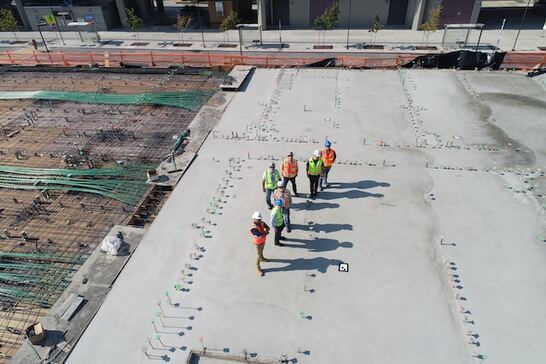|
By Attorney Edward Jesson
Just over a year ago, on May 18, 2023, the diesel engine on a trailer carrying spray foam insulation caught fire. That fire spread to the first floor of the 239 unit apartment building that was under construction in South Park and ultimately caused the death of two workers on the sixth floor of the building who were unable to escape. Moreover, the North Carolina State Fire Marshall said that they almost lost eight to ten firefighters fighting the fire, but they were all luckily able to get out of the situation. Now, the North Carolina Fire Marshall’s office is attempting to adopt and implement the most recent National Fire Protection Association (“NFPA”) standards for the safeguarding of construction. The 2022 NFPA standards include a chapter specifically for improving fire safety in large wood frame structures, such as the one that burned down in South Park last year and the apartment complex that burned down while under construction in Raleigh several years ago. The updated NFPA standards include several new safety measures that are not currently being implemented in North Carolina. For example, the 2022 standards require that, when building a large wood framed structure, there is an onsite fire prevention program manager (who should be hired by the property owner) who is required to conduct and record daily inspections which can then be shared with local building department and fire department officials. There are other amendments to the North Carolina fire code, too, for example, it may ban torch applied roofing systems which are roofing systems requiring an open flame to install, and the new amendments to the code could limit the use of various direct fired HVAC systems that use combustion to generate heat. The proposed changes are set to go into effect on January 1, 2025. Prior to this, North Carolina usually updated its fire code every six years, however, these changes have been brought about quicker in direct response to last year’s South Park fire. If you need additional information regarding the new safety requirements, please don’t hesitate to contact the attorneys at Jesson & Rains.
0 Comments
By Attorney Edward Jesson - Updated 2/29/2024 (Originally Published 3/27/2019)
People and businesses get sued every day, and while no one enjoys being on the receiving end of a lawsuit, there are certain things that should be done to try and make the experience as painless as possible. In North Carolina, a lawsuit is generally started when an individual or a business (also called the “plaintiff”) files a complaint. The clerk of court issues a summons, which must be served on the defendant (the party being sued). This can generally be done by mailing it certified mail, return receipt requested, sending via FedEx or UPS, or having the county sheriff personally deliver a copy of the summons and complaint. Once the summons and complaint have been served, the defendant has 30 days to respond to the complaint in district and superior courts. In small claims court, when a defendant is served (in some instances this can be achieved by the sheriff leaving a copy of the complaint taped to the front door), they will usually receive a notice of hearing along with the complaint. Here is the first point that I would like to make clear: if you are served with a lawsuit, please do not wait until day 29 to contact an attorney. Evaluating your position as a defendant in a lawsuit and preparing the correct response takes time. While you can usually get a 30-day extension of time to respond, doing so at the last minute is not always possible, and the extension likely won’t be granted if it is after day 30. If you fail to respond to the complaint in time, the plaintiff may be entitled to a default judgment. It is exactly what it sounds like— they will automatically win “by default”! A default judgment can be hard to overcome once it is entered, and the excuse that you simply “forgot” to respond is usually not enough. Point number two: Do not answer the complaint without first consulting with an attorney. In an answer, you will generally just admit or deny the allegations to the complaint, but that is not the only response that is available. There are several ways that you may be able to get the lawsuit dismissed (meaning the case is thrown out), but that option is not available if you admit or deny allegations in the answer first. By doing that yourself, you may be preventing an attorney from later dismissing the lawsuit. For most people who are sued, it is for the first time in their lives (and hopefully the only time). Once the shock, confusion, and anger has worn off, it is important not to bury your head in the sand. Contact a litigation attorney who can help you navigate through the civil system and, hopefully, get your case resolved in the most efficient way possible. If done correctly, you may save a lot of money; however, trying to handle it yourself oftentimes results in the expenditure of more money. If you or anyone you know has been sued, please give the attorneys at Jesson & Rains a call. By Attorney Edward Jesson
Recently, the North Carolina legislature passed House Bill 488, key sections of which will go into effect on October 1, 2023. While most of the changes made to this law relate to the energy efficiency rules found in the North Carolina Building Code, there is one big change for people in the construction industry. North Carolina General Statute 87-1(a) governs who is required to obtain a North Carolina general contractor’s license prior to performing or bidding on work. The general rule was that any person or business that bid on or performed work which was valued at more than $30,000.00 was required to have a general contractor’s license prior to bidding on or performing that work (with a few exceptions). However, House Bill 488 amends the language of N.C.G.S. § 87-1 to state the following: [A]ny person or firm or corporation who for a fixed price, commission, fee, or wage, undertakes to bid upon or to construct or who undertakes to superintend or manage, on his own behalf or for any person, firm, or corporation that is not licensed as a general contractor pursuant to this Article, the construction of any building, highway, public utilities, grading or any improvement or structure where the cost of the undertaking is forty thousand dollars ($40,000) or more, or undertakes to erect a North Carolina labeled manufactured modular building meeting the North Carolina State Building Code, shall be deemed to be a "general contractor" engaged in the business of general contracting in the State of North Carolina. The extra $10,000.00 will allow many people who are not licensed with the state to bid on projects that they would have not been legally permitted to bid on before this amendment. It is important to note that the new law only applies to projects or contracts that are entered into after October 1, 2023—the new law does not apply retroactively. It is also important to note that whether you need a license to perform a certain item of work has no bearing on whether that work needs to be permitted or inspected by the relevant County. This change in the law does not mean that work which would require a building permit no longer requires that permit. This is a big change in the law that will likely have an effect on the building industry in North Carolina as a whole—especially on those projects ranging from $30,000 to $40,000 where there will probably be much more competition. If you need assistance with licensure, or other legal issues in the construction industry, don’t hesitate to reach out to the attorneys at Jesson & Rains. By Zach Markle, Law Student Intern
A contractor in North Carolina is smart to triple check their state government contract bids because inaccurate bids sometimes cannot be undone. North Carolina divides mistakes in bids into two classes: “judgment error” mistakes and “clerical error” mistakes. A “judgment error” mistake may not be undone once the bid is submitted. If a contract submits a bid and makes a mistake in judgment, like misjudging the amount of materials or the length of time needed for a project, he may be stuck with the bid as presented if the contract for the work is accepted. And if that is the case, any shortage in revenue to cover excess costs may have to be paid out of pocket. Further, if the contractor refuses to accept the project, he may forfeit their bid deposit or bid bond and potentially be subject to other penalties. If a mistake in the bid is a “clerical error,” the consequences are not as severe. North Carolina describes “clerical errors” as “unintentional arithmetic error or unintentional omission” that is related to, among other things, the work, labor, and materials included in the bid. This usually arises when a button is accidentally pressed on a calculator during the input of costs into a spreadsheet or bid software, but it can arise in other ways as well. If the mistake is found to be a “clerical error” and the bid was submitted in good faith, and the contractor can prove it during a hearing with the right evidence, the agency in charge of the project may allow the contractor to withdraw their bid from consideration without having to forfeit their deposit or bond. In order for a contractor to withdraw their bid, they must submit a request to withdraw in writing within 72 hours after the opening of bids, unless a longer period is specified in the instructions to bidders. They must then attend a hearing by the agency responsible for the project where they will be heard on whether or not they can prove that their bid is eligible for withdrawal. To make sure you do not spend needed resources or have to deal with added stress to an already stressful process, triple check those bids before submitting them! Should you have any questions about the process or need additional help, please don’t hesitate to call Jesson & Rains today. By Attorney Edward Jesson
The North Carolina Constitution, and North Carolina statutes, give contractors the right to file mechanic’s liens if they are owed money for completing “improvements” on real property. Improvements are defined in a statute, but generally speaking, anyone who performs work on real property, be it renovations, grading, architectural work, or otherwise, can file a mechanic’s lien in North Carolina. The purpose of filing a mechanic’s lien is to have the debt owed to the contractor paid by the responsible party (often, the owner of the real property). A contractor has 120 days from the “date of last furnishing” to file the lien. The “date of last furnishing” is simply the last date that the contractor (or architect, etc.) performed work on the real property. It is best to be conservative with this date as courts have ruled in the past that punch list items performed after the date of last furnishing do not push that date out further. The mechanic’s lien has to be filed with the clerk of court in the county where the real property is located and formally served (like a lawsuit) on the property owner and any other contractors that may be affected by the lien. It is important that the lien be properly drafted when it is filed—if there is a mistake and the 120-day deadline passes, you cannot simply amend a lien. Instead, the lien must be released and a new lien filed in its place. The contractor then has 180 days (again, from the date of last furnishing) to “enforce” the lien. To enforce a lien, you file a lawsuit and ask the court declare that your lien is valid and confirm the debt amount. Oftentimes, a lien enforcement lawsuit will also include other claims, such as a claim for breach of contract. If the contractor is successful, he/she can then request that the court order what is essentially a foreclosure sale on the property to satisfy the debt. If there are other liens attached to the property, like a mortgage, the contractor will have to get in line. The existence of other liens is something to take into account when evaluating the benefits of moving forwards with a lien enforcement action. In reality, most lien situations are resolved prior to a foreclosure sale, because (1) property owners don’t want their property sold and (2) attorney’s fees may be awarded in the lien enforcement lawsuit. North Carolina’s mechanic’s lien statute contains an attorney’s fee provision that awards attorney’s fees to the prevailing party. That is very rarely the case in the United States (normally, parties are responsible for their respective fees, regardless of whether they win or lose), so it can be a powerful negotiating tool. If a contractor loses, they may have to pay the other side’s attorney’s fees, which can often total more than the debt owed itself, so it is important to seek the advice of a construction lawyer when evaluating whether you should file a mechanic’s lien. There are many other factors to consider when getting ready to file a lien, and there are other types of liens that can be filed by subcontractors and others involved in the construction process. Should you have an issue with collecting money from a client or have had a lien filed against your property, please give us a call to help with your issue. By Associate Attorney Danielle Nodar
You may know that Jesson & Rains, PLLC offers a variety of legal services including estate planning, probate administration, business law and litigation, and construction contracts and litigation. But you may not know that they are also licensed in other states as well. Kelly Jesson, Edward Jesson, and Danielle Nodar are licensed to practice law in both North Carolina and Florida. Katheryn Currie is licensed to practice law in both North Carolina and Alabama. Hopefully, Ed and Katheryn will be licensed in South Carolina by the end of the year! By maintaining our licensure and good standing in multiple states, we are able to provide legal services to our clients that may reside in North Carolina but have businesses or real estate located in another state. For example, if you own real estate in Florida and need to retitle it, our attorneys can draft and record your Florida real estate deed. As our practice has become more virtual over the last few years, we are also able to assist our clients who reside out-of-state with drafting documents that must be from the client’s resident state, such as wills and powers of attorneys. If you have questions about how we can assist you with your legal needs in or outside of North Carolina, Florida, or Alabama, please let us know! |
Subscribe to our newsletter.AuthorKelly Rains Jesson Categories
All
Archives
July 2024
|
|
SERVICES |
SUPPORT |
©Jesson & Rains, PLLC ALL RIGHTS RESERVED.







 RSS Feed
RSS Feed

